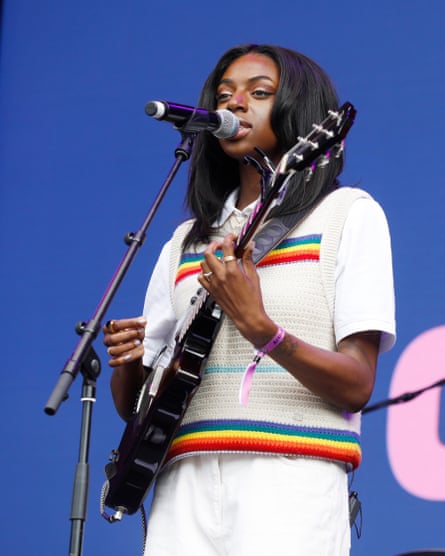Out of the 71 acts eligible for the gender-neutral award, only 13 were female or non-binary. The dearth exposes the British industry’s inability to develop anyone but young men.
More fool anyone who looks to awards ceremonies as arbiters of societal progress, but in 2021, when the Brit awards did away with gendered categories, it seemed as though the industry stalwart was moving in the right direction.
The decision came after Sam Smith, who came out as non-binary in 2019, was automatically excluded from that year’s best British male and female categories, despite being the sort of commercial behemoth who otherwise would be – and with three wins and nine more nominations, always had been – a shoo-in for stats-oriented Brits recognition. At the time of the 2021 nominations, Smith said: “I look forward to a time where awards shows can be reflective of the society we live in. Let’s celebrate everybody, regardless of gender, race, age, ability, sexuality and class.”
Nine months later, the Brits accepted that Smith was right and replaced those categories with a generic best artist prize, plus new genre-specific awards. In its first year, it was won by Adele, who beat Little Simz, Ed Sheeran, Dave and Sam Fender. But now, in year two, all five nominees are men: Central Cee, Stormzy, Fred Again, George Ezra and Harry Styles.

The Brits – run by the British Phonographic Industry, the trade body of the British music industry, and a reflection of commercial performance – flagged the inevitability of the situation. In response to the backlash, a spokesperson acknowledged that the lack of women and non-binary acts in the category was “disappointing”, but added: “We also have to recognise that 2022 saw fewer high-profile female artists in cycle with major releases as was the case in 2021.”
Fewer, maybe, but by no means none. To qualify for the award, an artist must have achieved at least one Top 40 album or two Top 20 singles during the eligibility period (10 December 2021 to 9 December 2022), which means that Beth Orton, Charli XCX, Emeli Sandé, Florence + the Machine, Kae Tempest, KT Tunstall and Mabel all qualified, and they’re plenty high-profile. Then there are the newer acts: guitarist Beabadoobee, dance star Becky Hill, empowerment pop star Ella Henderson, songwriter Nina Nesbitt, alt-pop star Rina Sawayama and sensual producer Shygirl.

Personally I’d swap Shygirl for the painfully generic Fred Again, the intriguingly maturing Florence for George Ezra (who’s getting there, but still has a foot in kid-pop) and the boundary-pushing pop star Charli XCX for Harry Styles’ lavishly dressed-up AOR. But regardless of who you’d rather see nominated, the fact that female and non-binary artists made up just 13 of the 71 eligible acts indicates a problem bigger than an awards ceremony.
In its statement, the BPI said it was “already carrying out a major study to identify barriers that may inhibit more women becoming successful in music, so that there can be solutions that result in meaningful change”. Given that the BPI and the British music industry are essentially one and the same you’d think it might already be aware of those barriers, which are manifestly clear. The list of eligible women shows a stark split. There are the pop stars who emerged more than a decade ago, pre-streaming, and had the chance to establish proper careers and supportive fanbases that allow for artistic growth and even missteps: Florence’s 2022 album Dance Fever continues the artistic streak she kicked off on 2018’s High As Hope; Charli XCX’s Crash metabolises her decade and a half in pop into a visceral, knowing pop album (and both have greater international profile than anyone but Styles on the best artist list).

On the same side are the independent artists Beabadoobee, Nesbitt, Shygirl, Sawayama and Tempest, trusted by their labels to realise their respective visions; notable too is Orton, also on an indie (and a relative Brits stalwart, with three nominations and one win) who was able to take six years between 2016’s Kidsticks and last year’s Weather Alive. They all have time on their side.
Then there are the newer pop girls: Mabel, Hill and Henderson, all active since the mid-2010s, all signed to major labels, all with massive singles chart success and a brace of previous Brit nominations between them (and wins for Hill and Mabel). Yet they each had to wait several years to release their full-length album or any followup record, which in turn dissipates any status boost accrued from those nominations and slows their careers. It reveals how differently majors develop new male and female artists today – Tom Grennan (who has collaborated with Henderson) has also had his biggest hits as a guest vocalist, yet he’s about to release his third album in five years. Meanwhile risk-averse label executives seem to have little ambition for their post-streaming female charges beyond cheap Friday night hits.
You might argue that their sort of club fare doesn’t lend itself to the album format, especially in a singles-oriented streaming age, but one, Mabel’s 2022 album About Last Night is pretty good, and two, you only have to look to Raye to undermine that suggestion. In June 2021, she tweeted that her label, Polydor, had been withholding her debut album despite the fact that she had scored 10 Top 40 hits in five years, either as the lead or guest artist very much in the dance bangers lane. A month later, both parties amicably parted and Raye proceeded as an independent artist. Her subsequent work has been great – with sharp production and dark themes, particularly about her time in the major-label system – and the week before last, she scored her first solo No 1 single with Escapism featuring 070 Shake. Her unequivocal flourishing reveals the limitations of major labels’ vision for their young female musicians. Her debut album, My 21st Century Blues, is eagerly anticipated for next month, and you wouldn’t be surprised to see her in next year’s Brit nominations.

This isn’t an argument to bring back the gendered categories – the international artist of the year cohort is Beyoncé, Burna Boy, Kendrick Lamar, Lizzo and Taylor Swift, which is hard to argue with – but one against the myopia of the British music industry as well the Brits as its warped mirror, reflecting commercial success yet tilting the field on which artists compete.
This year’s nominations caused further upset in the pop/R&B category, introduced last year. Some fans and musicians such as Mahalia bridled then at the combination of two separate art forms, though at least the nominated artists included one R&B-ish musician in Joy Crookes. This year’s contains none at all, though you assume that the BPI thought Cat Burns, a young Black musician, would tick that box, despite her being a melancholy songwriter explicitly influenced by the likes of Tracy Chapman, Lily Allen and Jimi Hendrix. As producer MNEK tweeted: “It’s whack cos the [general population] will think cos Cat is Black, she’s R&B.”
Despite its outward-facing attempt at breaking down boundaries between artists, the Brits evidently remain as committed to pigeon-holing as ever. Given how today’s musicians and fans disregard genre divisions and identity barriers, it puts them on a surefire and well-deserved path to irrelevance.















































